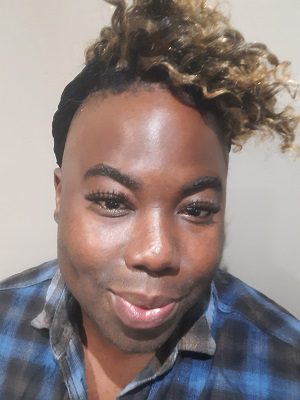By Dumiso Gatsha
Standing Representative for International Members (2021 – 2023)
Botswana

Dumi (they, them, their) is a proudly Pan African and unequivocally non-binary queer feminist working on eliminating the barriers between grassroots experiences and global policymaking. Dumi is the Founder of Success Capital Organisation; a youth-led, managed and serving organization working on strengthening and safeguarding LGBTIQ+ youth agency and autonomy in human rights and sustainable development whilst challenging power, privilege and patriarchy. Dumi serves on the IREX-USAID Global Youth Advisory Council, World Youth Forum for Democracy Board & appointed an African Youth Charter Hustler by the AU Youth Envoy.
The past weekend was the cumulation of an intriguing, engaging and lovely journey in learning about Amnesty International. I am reminded of my first Global Assembly experience in 2019 – amidst a myriad of experiences, both good and bad as an activist, personally and many other ways. One of the most memorable of highlights is in contributing towards Amnesty’s strategy online beforehand and in person in Johannesburg. The #NextStrategy webinar series was quite exhilarating; learning and engaging with the Secretary General at the time and other brilliant activists.
I see this point as my peak in youth activism – having worked 7+ years at a grassroots level. Access to such spaces for someone like me: a queer, bi-polar, non-binary, migrant feminist, have only been possible through programmes such as CIVICUS World Alliance’s Goalkeeper Youth Action Accelerator. Also, the sheer hunger for more and better in scaling scope and occupying space. So when I found myself standing in front of the Global Assembly, impassioned and having listened to a lot of conversations around policy, governance representation and global challenges (more importantly, I had navigated my way into the youth collective’s engagement – a community that inspired and further motivated), I thought to myself; how lucky I am to be in this space – better later than never.
One thing I noticed, is how many had been inducted and assimilated within the movement when young. How I would have longed for an opportunity to learn and engage in human rights work when younger. However, like Wangari Maathai once said; ‘human rights are not things that are put on the table for people to enjoy. These are things you fight for and then you protect.’ Being exposed to human rights issues and work would have helped me recognise much earlier that what happened to me was not normal. That structural and variant forms of violence should not have been normalized even in the misogynistic and sexist Afrikaans boarding school I attended in post-apartheid South Africa.
This past weekend only affirmed this, as discussions on policy issues and on anti-racism unfolded. It was a one-of-a-kind learning journey of what democracy should look like. As an international member representative; I can now comfortably assimilate and feel ‘safe’ to be and become within this movement. The few staff members I have had touch points with prior to assuming this role have been amazing. From side chats on the margins of regional convenings, through the Covid-19 pandemic in strengthening the strategy, consulting on youth issues and in orientating me and my fellow member representatives.
Amnesty International has taught me that you can remain divergent whilst being part of a wider collective. That existing beyond binaries and wealth-based framing of worthiness need not be a hinderance in being a part of a bigger picture. That social justice need not be so lonely and based on benefits for particular individuals. The phased engagements allowed me to assimilate, meet more members and better understand what it is to be a part of the movement. The many questions I have are yet to be answered and I am certainly looking forward to unpacking these bigger issues, guided by a feminist leadership approach to which our movement committed.
From co-moderating the International Justice webinar for international members, to learning about efforts in different Sections and appreciating the governance structure; I am in awe. There are a few things other international NGOs and movements can learn from Amnesty. Having seen two Global Assemblies, with one that had a great talk from former South African Constitutional Court Deputy Chief Justice Moseneke; I am in joy to have grown a little.
The privilege of connecting and learning from others must never be underestimated. Its reach in transforming how and what kind of change happens can never be documented in a monitoring and evaluation review. It is in this spirit that I reflect on the Global Assembly weekend and my journey with Amnesty; that there can be many others who can benefit from the power that is Amnesty within your reach or influence in whatever capacity you hold. That other survivors, people of colour and disenfranchised folks can take up the human rights mantle in their own right. That they may express themselves without retribution and still be a part of a bigger movement that is consistently adapting to the times through continuous learning, unlearning and re-learning. This is the kind of Amnesty I want to continue to be a part of; one that lives and advocates what it truly means to be born of dignity through solidarity and action for those who don’t have the power.


